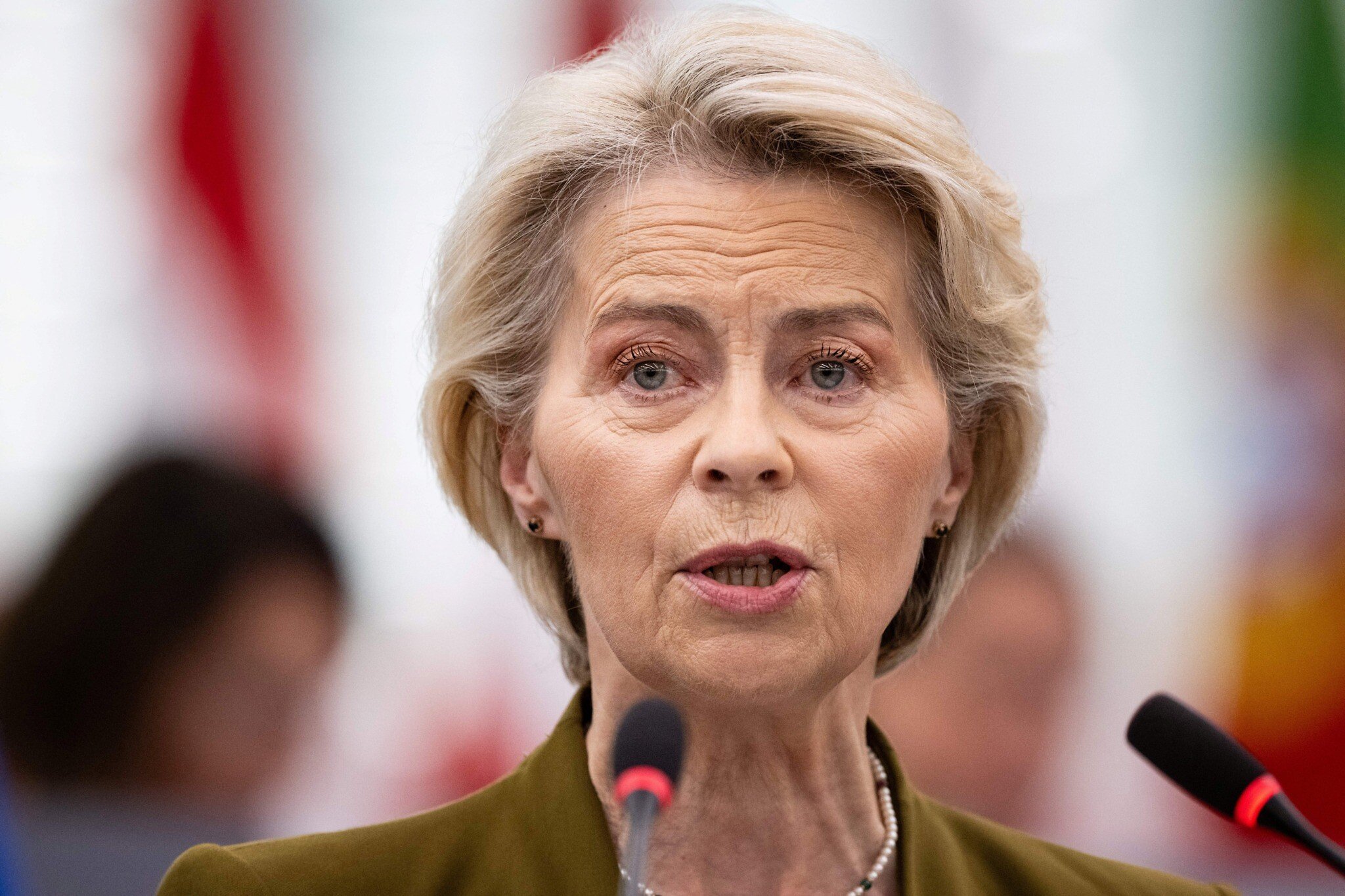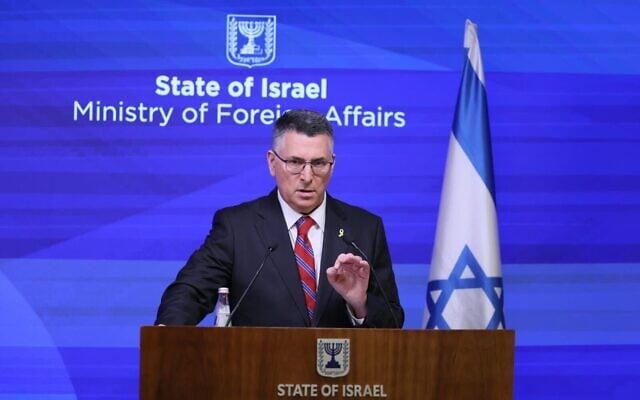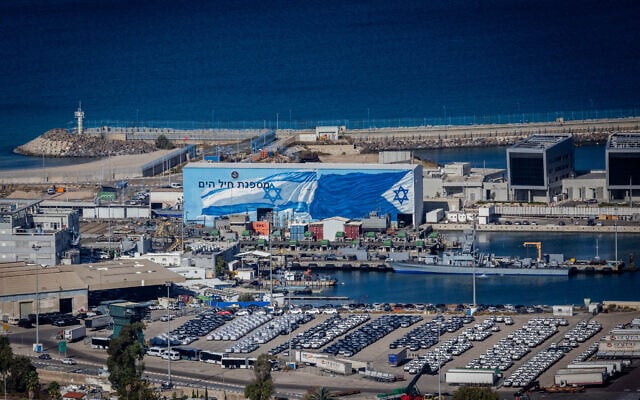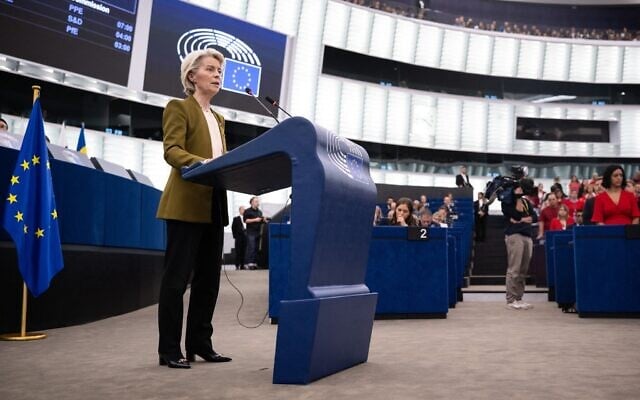


The European Commission formally presented its proposal for sanctions on far-right Israeli ministers and a partial suspension of the European Union’s association agreement with Israel, the EU’s executive body announced on Wednesday.
The sanctions, if approved, would strip Israeli imports of their preferential access to the EU. Israeli goods would have duties slapped on them at the same level as imports coming from countries with which the EU does not have a free trade agreement.
The Commission also called to suspend “bilateral support” to Israel, with the exceptions of civil society and the Yad Vashem Holocaust Remembrance Center.
The move marks a dramatic escalation of the EU’s response to Israel’s war in Gaza, as IDF forces drive into the heart of Gaza City.
“Actions taken by the Israeli government represent a breach of essential elements relating to respect for human rights and democratic principles,” a Commission review found. “This entitles the EU to suspend the Agreement unilaterally.”
“Specifically, this breach refers to the rapidly deteriorating humanitarian situation in Gaza following the military intervention of Israel, the blockade of humanitarian aid, the intensifying of military operations and the decision of the Israeli authorities to advance the settlement plan in the so-called E1 area of the West Bank, which further undermines the two-state solution.”

“The horrific events taking place in Gaza on a daily basis must stop. There needs to be an immediate ceasefire, unrestrained access for all humanitarian aid and the release of all hostages held by Hamas,” said Commission President Ursula von der Leyen.
Trade between Israel and the EU, the Jewish state’s largest trading partner, reached €42.6 billion (NIS 166 billion) in 2024, including €15.9 billion (NIS 62 billion) in Israeli imports. The EU accounted for nearly a third of Israel’s total international trade in goods last year.
If adopted, the EU would also suspend its annual €6 million (NIS 23.5 million) in financial support to Israel and €14 million (NIS 55 million) in annual support for projects supporting Israel in the context of the Abraham Accords, the normalization agreements between Israel and several Arab countries.
Foreign Minister Gideon Sa’ar on Wednesday called the proposed EU measures against Israel “morally and politically distorted.”
“Actions against Israel will harm the interests of Europe itself,” he said on X.
Sa’ar promised that “Israel will continue to fight, with the help of its friends in Europe, against attempts to harm it while it is engaged in an existential war. Steps against Israel will be answered in kind, and we hope they will not be necessary.”
Prime Minister Benjamin Netanyahu set off alarm bells in Israel on Monday when he suggested that Israel is “economically isolated” and might be required to become a self-reliant economy, which he termed a “super Sparta.” A day later, he held a press conference aimed at damage control, saying that he was speaking specifically about the defense industry, and that the problem was largely with “Western European governments.”

The European Council, which includes the leaders of the EU member states, now has to approve the trade proposal with a qualified majority in favor in order for it to take effect.
A qualified majority is reached with the support of 15 out of 27 members representing 65% of the EU population, a difficult threshold to reach at a time when European capitals continue to have diverging views on how to approach Israel and Gaza.
The sanctions would take effect 30 days after the decision is adopted and the EU-Israel Association Council is notified.
The measures against Finance Minister Bezalel Smotrich, National Security Minister Itamar Ben Gvir, violent settlers and 10 Hamas political leaders need unanimous support to be enacted.

Both far-right Israeli ministers have already been sanctioned by Australia, Canada, Britain, New Zealand and Norway. Slovenia and Spain, both EU members, have also said recently that they will ban the two.
EU foreign policy chief Kaja Kallas warned in June that Israel might be in violation of Article 2 of the Euro-Mediterranean Agreement, which governs Israel’s trade arrangements with the EU.
Kallas said the measures are meant to “leverage the tools at our disposal to pressure the Israeli government into changing course.”

Germany’s government has not yet decided on its stance toward the EU proposals to impose sanctions on Israel over its war on Gaza, a government spokesperson said on Wednesday. Berlin is one of Israel’s closest allies in the bloc.
“We are aware of the plans for sanctions. The [European] Commission has been discussing them for several days. They will be presented today and the German government has not yet formed a final opinion on them,” government spokesperson Stefan Kornelius said when asked about the plans at a press conference.
The head of Israel’s manufacturers association warned that the European Commission’s proposal is a “serious and disproportionate step” toward Israeli industry, which is attempting to keep operating at strength even while suffering the effects of war.
“This is a political decision disguised as a moral one, which undermines the foundations of economic cooperation between Israel and Europe,” said Israel Manufacturers Association president Ron Tomer. “Cooperation that has been built over decades based on values of innovation, freedom of trade and dialogue.”

Von der Leyen announced the impending measures last week in her State of the Union speech to the European Parliament in Strasbourg, France.
“What is happening in Gaza has shaken the conscience of the world,” she said.
“People killed while begging for food. Mothers holding lifeless babies,” she said. “Man-made famine can never be a weapon of war. For the sake of the children, for the sake of humanity. This must stop.”

Israel has rejected claims of widespread starvation in Gaza, and has emphasized its efforts throughout most of the war to facilitate the entry of humanitarian aid into the Strip.
Israel also denies targeting civilians, including those seeking food aid. It has acknowledged, however, that its forces, who often secure distribution sites run by the Gaza Humanitarian Foundation, have fired warning shots amid chaotic scenes. The UN says more than 1,000 people have been killed at aid sites, mostly from Israeli fire. Israel says the figures are exaggerated, but has not provided alternative numbers.

